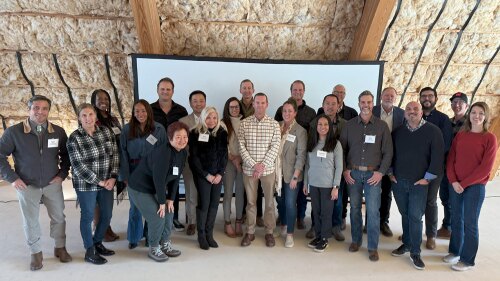As a volunteer for a nonprofit organization in its fledgling days, the typical 20-something does not often envision occupying the organization’s top position years later. That was certainly the case for Derek Goring, chair of ULI Toronto, when he joined the nascent district council in 2006. But as Goring’s career in land development advanced while he gained valuable experience volunteering on ULI committees, he gravitated toward taking on greater leadership roles in the organization. Now, after ten years of membership, Goring, vice president of development at First Gulf Corporation, has assumed the role of chair of the fast-growing 1,500-plus-member council.
Born in the small northern Ontario city of Sudbury, Goring moved to Toronto in 2000 while completing his undergraduate degree in mechanical engineering and commerce at McMaster University in Hamilton. After graduation, he joined Canadian homebuilder Minto as a business analyst in what would be his formal introduction to the world of real estate and land development.
A recommendation from an uncle who worked in real estate led Goring to explore ULI while looking for opportunities to expand his network and learn about the industry. An active member out of the gate, he joined the Young Leaders Group and immediately began planning events and taking advantage of networking opportunities.
After a hiatus from ULI while completing an MBA at the University of Toronto’s Rotman School of Business, Goring joined the membership committee and eventually became its cochair. It was his time chairing the committee that motivated him to consider taking on a leadership role in the organization.
As he progressed through the ranks of ULI Toronto, Goring was also making his mark in the city’s land development industry, building a résumé that includes notable positions at several public sector organizations.
After spending more than four years with Minto, Goring joined the staff of Waterfront Toronto, where he worked on many major development sites that have reshaped key areas of the Toronto waterfront, including the Canary District. He also worked at Infrastructure Ontario, leading its newly created land development department. “It was an unbelievable opportunity to change the city,” he says.
In 2014, Goring moved back into the private sector, taking his current position at First Gulf Corporation, which develops office, mixed-use, retail, and industrial properties. At the same time, he was named vice chair of mission advancement for ULI Toronto, as Rob Spanier, partner and principal at real estate development and advisory firm Live Work Learn Play, was appointed chair. Goring credits Spanier with changing the management committee’s mentality toward membership growth, as he pointed to other North American district councils with thousands of members as examples of the scale that Toronto should aspire to reach.
“[Rob] pushed us to think differently and we started actively doing things to grow at that scale,” Goring says. Under Spanier’s leadership, ULI Toronto’s membership more than doubled. Goring, who assumed the position of chair in July 2016, is committed to keeping the momentum going. “The growth we have experienced has been transformative for the district council,” he says.
Richard Joy, executive director of ULI Toronto, believes that Goring’s chairmanship came at a “pivot point” in the evolution of the council. “After two incredible years of organizational capacity building that saw our membership more than double, it was time to leverage this toward a stronger community impact focus,” Joy says. “Under Derek’s leadership, ULI Toronto is now focused on delivering more on-the-ground, in-the-community initiatives that have us broadening our core engagement of land use professionals to civil society leadership.”
Among Goring’s goals for ULI Toronto is to more closely engage the broader Toronto community in discussions related to urban growth. To achieve this, Goring and the management committee have added resources to the outreach committee, which is tasked with advancing the district council’s Electric Cities initiative—a campaign to “generate transformative urban development that creates environmentally sustainable neighborhoods with a mix of diverse office, commercial, civic, entertainment, and residential uses.”
Direct community engagement is a cornerstone of the initiative. Goring is confident that this strategy will help the Toronto community better understand the benefits and trade-offs that development can bring and foster a more productive dialogue involving government, industry, and the community.
The opportunity to lead ULI Toronto has deepened Goring’s appreciation of the Institute’s tradition of giving back. “The more you put in [to ULI], the more opportunities you get to continue to contribute. That’s a culture I want to continue to nurture,” he says.
Learn more about ULI Toronto’s activities; follow the council on Twitter at @ULIToronto.
Sean MacKay is a ULI Toronto member and is managing editor of BuzzBuzzNews.





